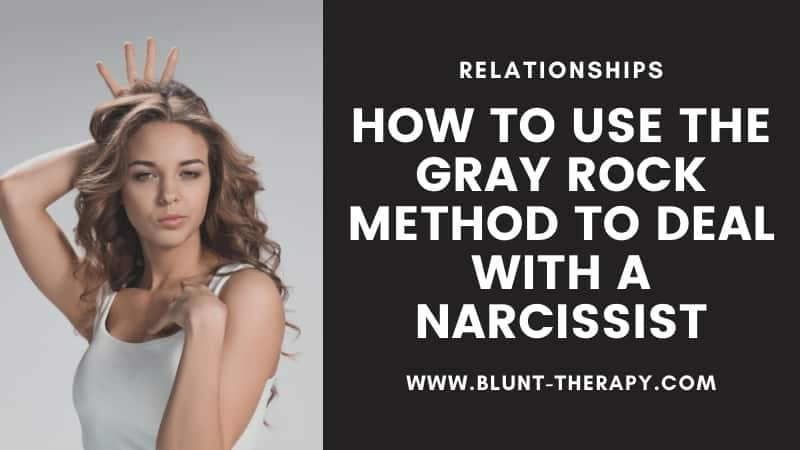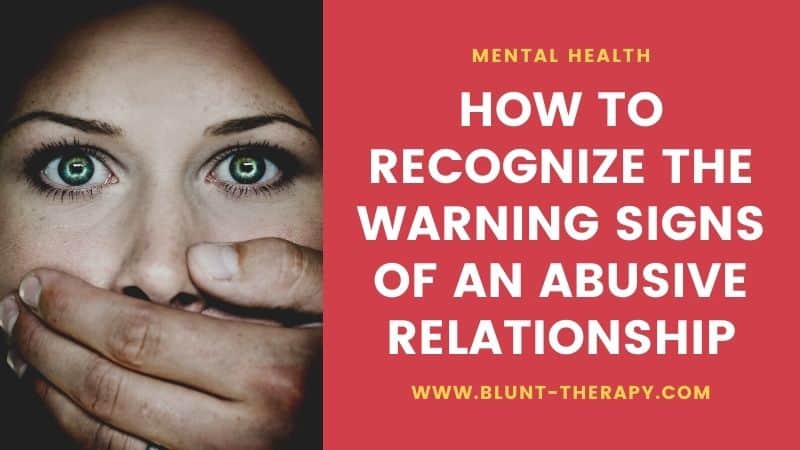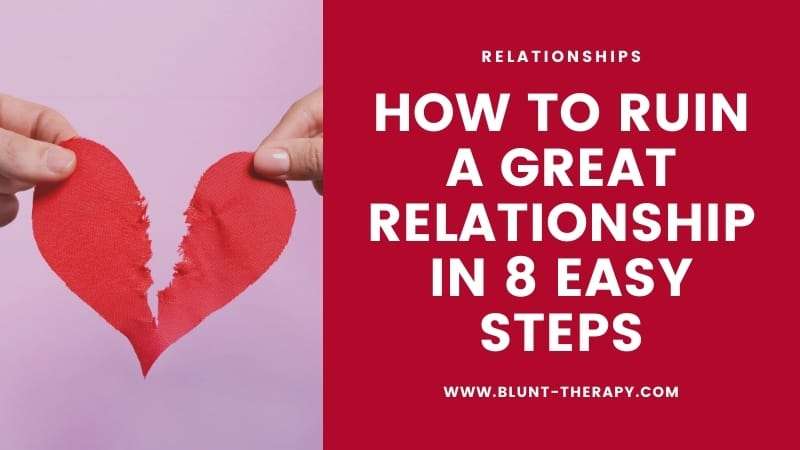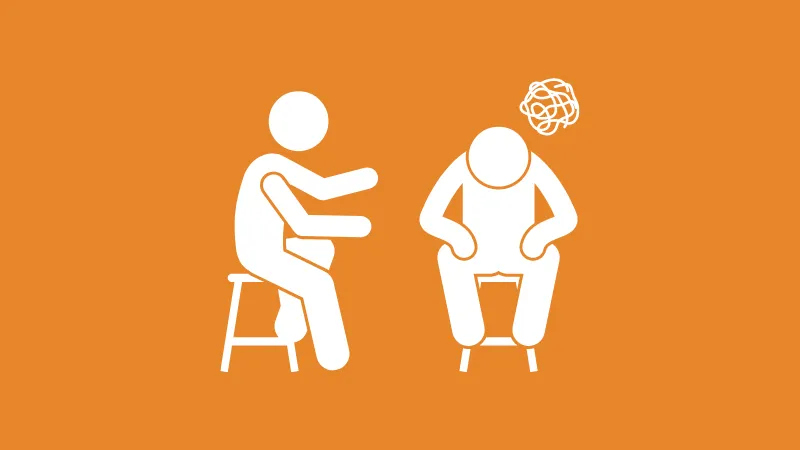Table of Contents
Affiliate link notice: As an affiliate of BetterHelp and other third-party vendors, We will receive compensation if you make a purchase using the links provided on this page. For more information, visit our disclosure page.
Last Updated on December 12, 2021 by Randy Withers, LCMHC
Emotionally abusive relationships are shockingly common. Research conducted in 2013 on 250 men and women found that emotional abuse was a factor in 80% of their relationships.
Have you ever been in an emotionally abusive relationship? Do you think you’re in one now? Would you even know it if you were?
Sometimes the warning signs of an emotionally abusive relationship are hard to spot. So we’re going to talk about what emotional abuse is, how to spot it, and what you can do to get help.

What Is Emotional Abuse?
Simply put, emotional abuse is any type of abuse that is not physical in nature.
Emotional abuse is about control. Abusers use the victim’s own emotions to manipulate them. Their weapons include blame, embarrassment, shame, humiliation, threats, and criticism.
While most relationships see some aspect of these behaviors, emotional abuse is defined by aggression, consistency, and intentionality. It’s never something you should tolerate or excuse.
You’re most likely to see emotional abuse in a romantic relationship, but it can also occur in relationships with friends, family members, and co-workers.
Sometimes emotional abuse is obvious, but it’s often hard to spot, especially if you don’t know what to look for.
For the purposes of this post, we’re going to keep the conversation limited to romantic relationships. However, the warning signs we’re going to discuss can manifest in other types of relationships as well.
Warning Signs of An Emotionally Abusive Relationship
At the beginning of most romantic relationships, both partners tend to be on their best behavior, treating each other with an abundance of love and kindness.
However, after the newness wears off, so does the veneer, and you start to see who your partner really is – warts and all.
It might start in little ways at first – an insult, or jealousy that comes across as endearing at first, or trying to control you under the guise of concern.
It’s easy to brush off in the beginning, but over time it gets worse and harder to ignore. Now, the relationship that started out as a source of joy fills you with dread.
One of the most important things you can do to protect yourself is to recognize the signs of an abusive relationship as early as possible. If you already know that your relationship is headed in the wrong direction, it may be time to think about leaving or reaching out for help.
If you’re not sure, but you feel something isn’t quite right, you would be wise to examine your relationship further. Below are seven warning signs of an emotionally abusive relationship to watch out for.
Controlling Behaviors
Controlling behaviors are the essence of an emotionally abusive relationship. All abuse is about control, so it’s important that you’re able to recognize it when you see it.
Don’t confuse controlling behaviors with the occasional insistence on choosing where to go to dinner or what to watch on Netflix. Everyone does stuff like that from time to time. The type of control I’m referring to is pervasive and can extend to even minor things.
But there is nothing minor about it.
Often, abusers seek to control fundamental parts of your life. For example, a controlling partner won’t want you to dress in certain ways, spend time with family or friends, or they’ll want to know where you are at all times.
Criticism
When you’re constantly bombarded with criticism on how you did something wrong or that you’re not good enough, it’s a sign of an abusive relationship.
Everyone has a bad day now and then and may be overly critical of their partner.
However, in an abusive relationship, the criticism extends way beyond that: everything the victim does or says is wrong.
Over time, you’ll start to realize that nothing you do is enough. You will start to feel helpless, and it’s easy at that point to get caught in a cycle of trying to please a person who is only interested in controlling you.
Isolation
Isolation is another common hallmark of an emotionally abusive relationship. It occurs when abusers try to physically or emotionally distance you from family and friends.
Perhaps your partner wants you to move away from your family so you can’t spend as much time with them. Or maybe they discourage you from having friendships or work relationships.
Whatever the specific action may be, the abuser’s goal is to be the only person in your life, thereby creating a dependence upon them. This relates to control as well – if they are all you have, you become much easier to control.
Gaslighting
Gaslighting is a form of psychological manipulation that makes the victim question their own sanity.
Examples include insisting something is true that you know for a fact is not, or saying that you are overly emotional when there’s a legitimate reason to be upset.
The point is to transfer focus from the partner’s actions onto yours. This causes you to doubt yourself and mistrust your own feelings and memory.
A classic example is “I never said that,” when in fact they did. Or if you get upset when your partner insults you, who then scoffs that you have no sense of humor and they were only kidding.
Gaslighting has a way of eroding self-confidence. You don’t trust your own thoughts or your own judgments. It’s yet another weapon that emotionally abusive people use to control their partners.
To learn more about Gaslighting, check out the video below:
Jealousy
Let’s face it – a little bit of jealousy is healthy in relationships. It’s even a bit flattering.
But the jealousy I’m talking about here goes beyond feeling annoyed when you see someone flirting with your partner. The level of jealousy seen in an abusive partner is just flat-out toxic.
At first, it may come across as endearing or as proof that “he’s just a little overprotective” or that “she really loves me.” But it never stays that way. As with all other forms of abuse, it will continue to grow in intensity and frequency.
If your partner wants passwords to your social media accounts to check up on you, doesn’t want you to spend time with family or friends, or tries to track your movements, this absolutely a sign of emotional abuse.
Stonewalling
Effective communication is the hallmark of any healthy relationship. Conversely, poor communication is a telltale sign of a relationship that has turned toxic.
While verbal abuse such as shouting and name calling is easy to spot (and hear), it is often the absence of communication that is the worst form of verbal abuse. One of the best examples of this is called stonewalling. It’s also known as The Silent Treatment.
Does your partner refuse to talk to you when they don’t get their way? If they don’t like something you have done, does their silence last for days or sometimes even weeks?
Do they hang up the phone on you, ignore your texts, or otherwise refuse to engage with you?
It’s one thing for a partner to have a “cooling off” period after an argument, or perhaps before one starts. That’s actually healthy.
But if you notice a pattern where silence is used as a weapon, you may be the victim of stonewalling.
A licensed therapist on BetterHelp is well-suited to help you with relationship issues, provided there is no violence occurring. Sign up today and get 10% off your membership.
Walking on eggshells
Maybe as you’re heading home after a long day at work, you think about the evening ahead. In the past, you’ve looked forward to it, but now, you start to dread the moment you walk in the front door.
Will you see the happy and smiling partner you originally fell in love with? Or will you be confronted with an angry, unkind, sulking person looking for a fight?
Pay attention to that feeling in your gut, because it’s important. If you’re constantly nervous about what mood your partner will be in, and you start to plan how to avoid or mitigate the bad moods, you may very well be in an emotionally abusive relationship.
Note: This feeling of “walking on eggshells” is often associated with people who suffer from Borderline Personality Disorder. Check out our article on BPD if you’d like to learn more.

Conclusion
This is by no means a comprehensive list, but these are some of the key indicators you may notice when your relationship begins to take a turn toward abusive territory.
We all have high hopes for a relationship in the beginning, and most of us want to think the best of our partner. Unfortunately, it doesn’t always work out the way we want it to. It’s very important to be able to recognize the signs of abuse and to know that there is help available.
If you recognize some or all these signs in your relationship, it may be time to leave.
At the very least, it may be time to seek professional help. A licensed therapist can help to process the situation and help you make sense of what has been happening to you. Please know that if you need help, you are not alone.
If you’re in danger, please call 911 immediately. There’s also help available from the National Domestic Violence Hotline. Call them at 1-800-799-7233 or visit them online at thehotline.org.
Don’t be afraid to reach out.
Shop now at Amazon.com
References
- Emotional abuse in intimate relationships: The role of gender and age
- What Is Emotional Abuse?
- Gaslighting: Signs and Tips for Seeking Help
- The National Domestic Violence Hotline
- 7 Forms of Elder Abuse & How to Recognize the Abuse of Seniors










A good list. Never get confused between love and trauma bonding.
That’s an excellent point. Thanks!